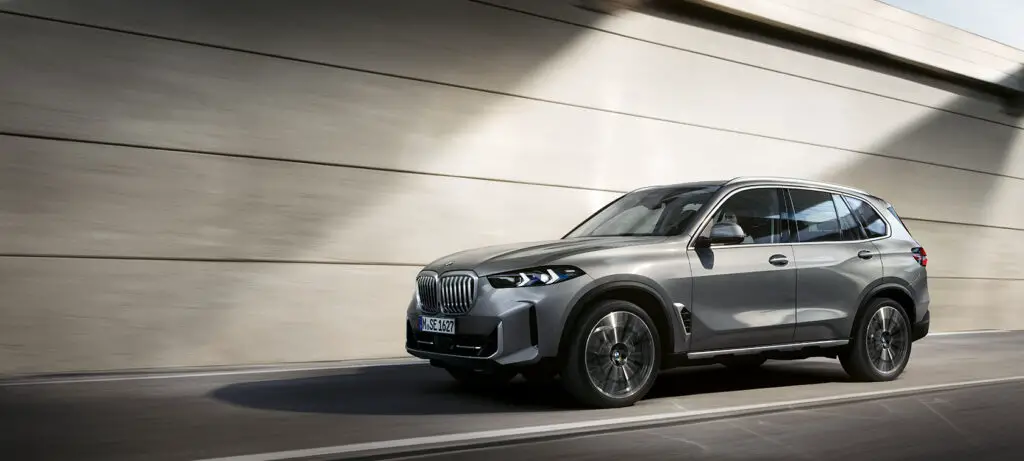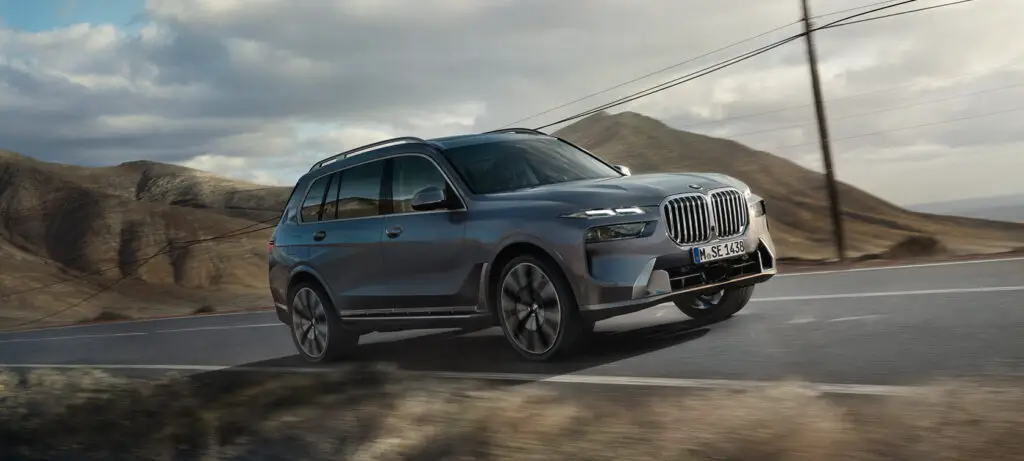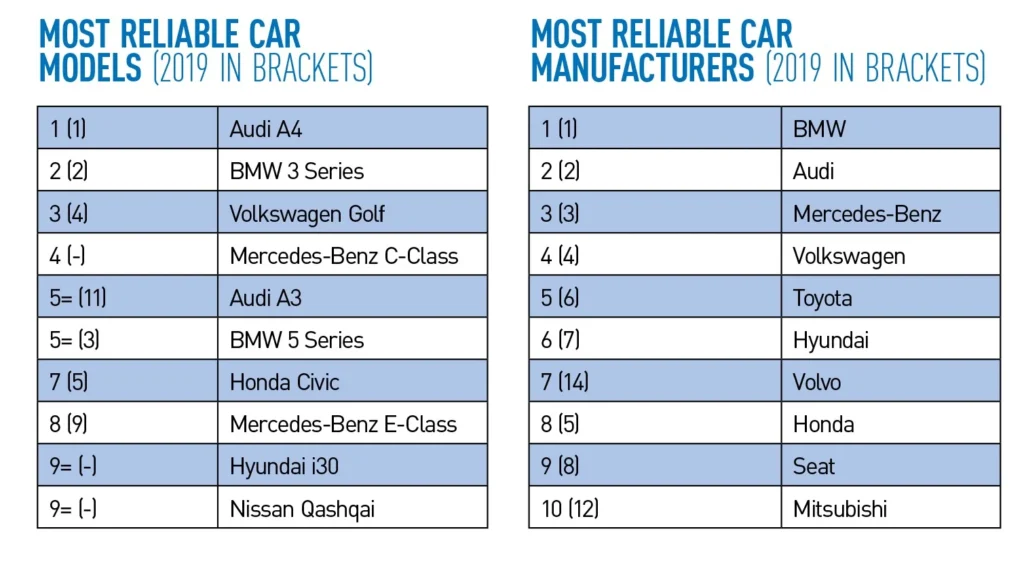For luxury vehicle shoppers wanting a blend of performance, technology, and utility, few brands carry the cachet of BMW. The German automaker’s “Ultimate Driving Machine” tagline promises a combination of exhilarating dynamics and premium features in a design-forward package. And in recent years, BMW’s lineup of Sports Activity Vehicles (SAVs) like the X3, X5, and X7 has given buyers a more family-friendly way to experience the brand.
| BMW SUV Model | Reliability Rating | Potential Issues |
|---|---|---|
| X3 | Above Average – Solid ratings from Consumer Reports, RepairPal. Improved over previous generation. | Engine problems, electrical issues, some interior quality gripes. |
| X5 | Average to Above Average – Current model much improved over problematic previous gen. RepairPal rates it 4.5/5. | Engine, transmission, electrical systems may need larger repairs over time. |
| X7 | Average – Still too new for extensive data, but initial ratings about average. Infotainment and electronics may be trouble spots. | Complex systems, potential interior build quality concerns. |
But one of the biggest questions surrounding any BMW product is: How reliable are they? For all of BMW’s performance brilliance, the brand hasn’t historically ranked at the top of the pack for predicted reliability and dependability ratings. So where do their SUV offerings stand? Let’s take a deep dive.
BMW X3 Reliability

Review As BMW’s compact luxury SUV offering, the X3 is a direct competitor to vehicles like the Audi Q5, Mercedes-Benz GLC, and Acura RDX. The current third generation, launched in 2018, has fared quite well in terms of reliability according to major rating sources.
Consumer Reports
data shows the 2018-2022 X3 earning a respected “Above Average” used car prediction from thousands of owner surveys. J.D. Power’s Vehicle Dependability Study (VDS) rated the 2019 X3 better than most competitors in that model year. And RepairPal gives the X3 a high 4/5 reliability rating, ranking it 3rd out of 19 luxury midsize SUVs.
Common issues reported by owners include occasional engine problems (excessive oil consumption, leaks), electrical bugs, and some interior quality gripes. But overall, the X3 seems to be among BMW’s most dependable and trouble-free models when cared for properly.
The previous X3 generation (2011-2017) had more ups and downs. While engines were generally robust, issues with fuel systems, cooling systems, and electrical accessories brought down its reliability ratings, especially as miles accumulated. So the current model does appear to be an improvement.
BMW X5 Reliability

Review Moving up to the midsize luxury SUV segment, the BMW X5 continues to be one of the brand’s top sellers year after year. The current fourth-generation model, launched in 2019, has scored solid ratings for dependability so far.
Consumer Reports
data predicts the 2020-2022 X5 will have above average reliability when used. Similarly, RepairPal gives the X5 a great 4.5/5 rating compared to other luxury midsize SUVs. Areas that could require larger repairs include the engine, transmission, and electrical systems. But overall, the new X5 seems to be an improvement over its predecessor.
That previous 3rd-generation X5 (2014-2018) was frankly a bit of a reliability nightmare for BMW. While powerful and luxurious, that model was plagued by an abnormally high number of issues according to consumer data. Everything from engines to fuel systems to complex chassis components caused major headaches and unexpected repairs for owners. As a result, it earned dismal reliability ratings that failed to live up to its premium pricetag.
Fortunately, the current X5 seems to have corrected many of those problems. But it does underscore the importance of generational changes when it comes to luxury makes like BMW. Dramatic year-over-year improvements can occur.
BMW X7 Reliability Review

As for BMW’s flagship SUV offering, the X7 is a relative newcomer having debuted in 2019 as a 2020 model. Being BMW’s largest SAV to date with three spacious rows, the X7 aims to deliver an ultra-premium experience for families prioritizing interior luxury over outright performance.
With its limited time on the road so far, the X7’s long-term reliability remains to be seen. But initial data has been mostly positive. Consumer Reports rates the 2020-2022 X7’s potential reliability as about average based on owner feedback so far. RepairPal also gives the X7 a solid 4/5 reliability rating.
Potential trouble spots called out by owners include the X7’s complex infotainment systems, in-car electronics features like driver assists, and some build quality niggles with the interior materials. But the core operating systems like engine, transmission, and chassis have been relatively robust to this point.
Reliability of Older BMW SUVs

While the current BMW SUV lineup seems to be on more solid footing based on expert data, owners of older and discontinued models haven’t fared as well. Both the X5 and X3 models from the 2010s in particular experienced a number of quality issues over their life cycles that hurt their scores.
The BMW X5 from 2007-2013 was plagued by fuel system problems, engine issues like timing chains and excessive oil consumption, as well as transmission woes on higher mileage examples. The X3 from 2011-2017 had similar issues with engine components, cooling systems, and electronics gremlins hampering its used car reliability ratings.
This only underscores the reality that BMWs, even the SUVs, tend to be more complex and demanding of strict maintenance in order to retain their white-glove luxury experience. Deferred maintenance often leads to larger repair bills down the line.
What the Experts
Say About BMW SUV Reliability While reviews of BMW’s latest SUV models have been fairly positive, the brand still ranks about average overall for predicted reliability ratings compared to competitors. Both J.D. Power and Consumer Reports score BMW roughly in the middle of the pack among luxury automakers.
RepairPal’s analysis gives some useful perspective, rating BMW a 2.5/5 for reliability, placing it 31st out of 32 brands. “The luxury German brand is hit or miss for reliability and ownership costs may be higher than average,” RepairPal notes.
That mixed-to-average reliability assessment seems to be the consensus from third-party experts who analyze real-world data. BMWs cost more to maintain over time, and have more potential trouble points due to their engineering complexity and feature-rich offerings. But when cared for properly, they can absolutely provide years of relatively dependable service.
“You have to be on top of servicing with BMWs,” says automotive analyst Mike Quincy. “The brand builds in a lot of performance which puts extra stress on components. Whether you’re looking at an X3, X5, or other model, staying ahead of the maintenance schedule is critical if you want it to last.”
Tips for Reliable BMW SUV Ownership So what maintenance items and general tips should BMW SUV owners prioritize? Here are several key recommendations:
- Follow the Service Schedule Diligently: Can’t stress this enough – adhere to BMW’s recommended service intervals like clockwork, no matter the cost. Things like oil changes, fluid flushes, filter replacements, and general inspections from BMW-approved technicians are critical.
- Find a Trusted BMW Service Center: While tempting to take your BMW to any old mechanic, having it serviced by BMW-trained technicians who understand the nuances of the brand’s engineering can pay dividends. Look for Centers with solid customer reviews.
- Use BMW OEM Parts Whenever Possible: Replacing components like brakes, batteries, cooling systems etc. with genuine BMW parts can aid reliability and prevent further issues down the line.
- Purchase a Warranty Plan: BMWs offer relatively inexpensive extended warranty plans that can cover you well beyond the factory warranty period. This provides extra protection when repairs crop up.
- Be Proactive With Maintenance: If a “check engine” or dashboard warning light appears, don’t ignore it. Have it checked out immediately before issues potentially escalate.
- Keep Service Records: Following a complete paper-trail of all repairs and maintenance can benefit reliability and aid resale value if you choose to sell your BMW SUV later on.
By taking a proactive, diligent approach to maintenance and using BMW Approved resources, owners can help maximize the reliability and dependability of their luxury SAV over the long-term.
The Verdict:
Should You Buy a BMW SUV? So are BMW’s SUVs a smart choice for reliability-minded luxury shoppers? Here’s a balanced take:
If maximum long-term dependability, low operating costs, and repair-free ownership are your highest priorities, there are likely better luxury SUV options from brands like Lexus, Acura, and Genesis. Their vehicle ratings for reliability consistently rate higher.
Also Read:
- BMW X7 vs Mercedes GLS: Which Luxury SUV Reigns Supreme?
- 2023 Volvo XC60 Review: A Luxurious and Capable SUV
- Audi vs Volvo: Which Brand is More Reliable?
- Are Volvos Reliable? A Comprehensive Look
However, if you’re willing to accept about average predicted reliability in the trade-off for BMW’s combination of performance, engineering prowess, premium luxury features, and distinctive looks, their current SUV lineup can absolutely provide years of driving enjoyment with proper care and maintenance.
BMWs require more ownership diligence and up-front commitment. But by utilizing BMW-approved resources and service, setting aside a healthy vehicle maintenance fund, and adopting a proactive mindset for repairs, you can mitigate the gremlins that come with the


[…] Are BMW SUVs Reliable? A Comprehensive Deep Dive […]
[…] Are BMW SUVs Reliable? A Comprehensive Deep Dive […]